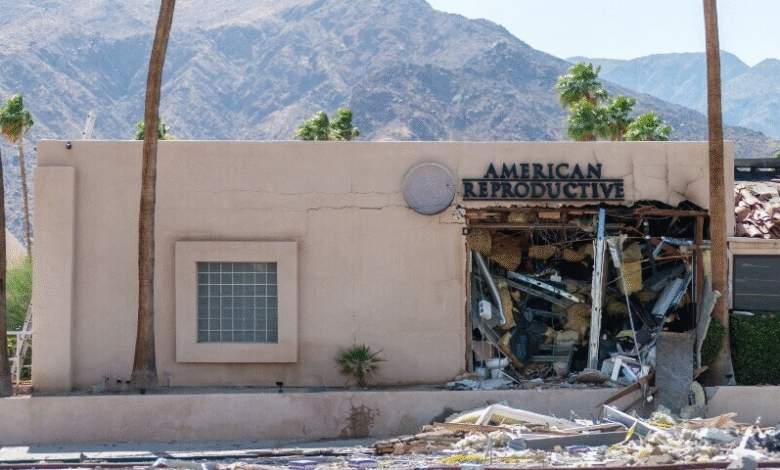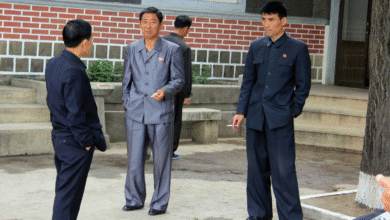California Fertility Clinic Bombing Linked to Anti-Natalist Ideology

On May 17, 2025, the California fertility clinic bombing shook the quiet streets of Palm Springs, where an explosion outside the American Reproductive Centers clinic left one dead and several injured. This devastating act of violence, now under intensive FBI investigation, appears to be rooted in anti-natalist ideology—a belief that opposes procreation. Authorities are delving deep into the social media presence of the suspect, who reportedly demonstrated a concerning fixation on this ideology through posts and audio recordings. This troubling incident has reignited discussions about reproductive health violence and its alarming intersection with domestic terrorism in California. As law enforcement works tirelessly to piece together the motivations behind this explosion, the community grapples with the implications of such an extreme manifestation of ideological dissent.
In what can only be described as a shocking act of domestic terrorism, a bombing at a reproductive health facility in California has raised significant concerns about the rise of anti-natalist sentiments. The Palm Springs explosion, which tragically resulted in loss of life and injuries, underscores the urgent need to address the violent manifestations of beliefs that oppose childbirth and family expansion. As investigators sift through evidence and digital traces left by the perpetrator, the connection to extremist ideologies becomes increasingly apparent. The implications of this act extend beyond the immediate tragedy, prompting wider conversations about safety in reproductive health services and the vulnerabilities they face. As this investigation unfolds, it serves as a stark reminder of the potential for violence that ideologies can inspire when left unchecked.
Understanding Anti-Natalist Ideology and Its Extremes
Anti-natalism, a philosophical stance that questions the morality of procreation, has gained significant attention in recent years. This ideology posits that bringing new life into the world is inherently negative due to potential suffering and environmental concerns. With ideologues often sharing their views on social media, radical interpretations can emerge, leading individuals down a dangerous path. In the case of the California fertility clinic bombing, this belief system has seemingly inspired violent actions, reflecting the extreme lengths to which some may go in the name of such a philosophy.
The tragic events surrounding the bombing underscore a disturbing trend where ideological beliefs can manifest into violence against reproductive health facilities. This incident highlights the urgent need for discourse around anti-natalist ideology and its implications on societal norms and familial values. As the investigation unfolds, both the FBI and community members are grappling with the broader implications of ideological extremism, making it crucial to address these ideologies to prevent future acts of violence against vulnerable sectors.
The Impact of the California Fertility Clinic Bombing
The bombing at the California fertility clinic serves as a stark reminder of the consequences that extremist ideologies can have in real-world situations. With one life lost and multiple injuries inflicted, the psychological and physical damage inflicted on the victims and the surrounding community is profound. This incident has raised important questions about security measures at reproductive health facilities, especially as acts of terrorism in California have become increasingly linked to ideological motivations.
From a broader perspective, the bombing has sparked a conversation about reproductive rights and the safety of health care providers and their patients. Clinics providing services such as in vitro fertilization or family planning have long faced hostility, but this act of violence brings a new level of urgency for protection and support. As authorities work tirelessly to gather evidence and establish a timeline, the importance of creating a safe environment for individuals seeking reproductive health services cannot be understated.
The Role of Law Enforcement in Investigating Ideological Terrorism
In the aftermath of the California fertility clinic bombing, law enforcement agencies, including the FBI, are under immense pressure to effectively investigate the motivations behind the attack. This tragedy has brought to light the importance of understanding ideology when it comes to preventing acts of terrorism. Agencies are focusing on the suspect’s social media activity and online presence to piece together a coherent narrative of ideologically driven violence, which is a growing concern in today’s society.
Investigative measures are complex and require thorough examination of physical evidence alongside digital footprints. Law enforcement is committed to uncovering the suspect’s connections to anti-natalist ideology and identifying any networks that may emerge from this investigation. By utilizing forensic evidence and witness testimonies, the FBI aims to ensure that this incident is not an isolated act, thereby enhancing community safety and awareness against the backdrop of rising reproductive health violence.
Community Responses to Terrorism in California
The community’s reaction to the bombing at the fertility clinic reflects a mixture of shock, fear, and resilience. In immediate response, community members have rallied together to support the victims and reinforce the importance of reproductive health services. Local advocacy groups are leveraging this event as a catalyst for raising awareness about the critical nature of reproductive rights, emphasizing the need for solidarity and understanding in the face of ideological extremism.
Furthermore, the Palm Springs community is coming together to demand increased security measures for reproductive health facilities. After the FBI classified the explosion as an act of terrorism, residents are engaging in constructive dialogues with law enforcement to bolster safety protocols. This incident serves as a pivotal moment for the community, highlighting the collective need to address the underlying issues of ideological extremism while fostering a safe environment for all.
Exploring the Links Between Depression and Violent Ideologies
The background of the alleged bomber reveals a troubling relationship between mental health struggles and the adoption of violent ideologies. The suspect, reported to be grappling with depression and personal issues, raises important questions about the intersection of mental health and anti-natalist beliefs. Mental health professionals stress the importance of addressing underlying psychological conditions before they manifest into harmful actions, emphasizing the need for accessible support systems.
Conversely, it is essential to recognize that while mental health issues can lead individuals to radical thoughts, they do not inherently cause violence. A comprehensive understanding of this phenomenon requires examining the broader societal influences that may lead someone toward extremist ideologies. By focusing on prevention and intervention, communities can begin to dismantle the appeal of violent ideologies that prey upon vulnerable individuals.
Analyzing the Aftermath of the Palm Springs Explosion
The aftermath of the Palm Springs explosion has created a palpable sense of urgency among local law enforcement and community leaders. The extensive damage inflicted within a 250-yard blast radius raises ongoing safety concerns for surrounding medical facilities and their patients. As authorities continue to clear the site and conduct forensic examinations, the community awaits updates on the condition of those injured and the status of ongoing investigations.
Additionally, the bomb’s impact reverberates beyond physical destruction; it has sparked deep conversations about the sociopolitical climate around reproductive rights in California. As the FBI maps out the incident’s timeline, community leaders are advocating for increased awareness and protection for reproductive health clinics facing hostility. This incident underscores the necessity of vigilance and proactive measures to ensure safety in the midst of ideological violence.
The Importance of Safety Protocols in Reproductive Facilities
The California fertility clinic bombing has illuminated the critical need for enhanced safety protocols in reproductive health facilities. Following the explosion, clinics are likely to review their security measures, embracing comprehensive emergency response plans. Ensuring that staff and patients feel safe in these environments is paramount, particularly in light of recent acts of violence associated with anti-natalist ideology and other extremist views.
Moreover, applying best practices in safety protocols not only protects individuals but helps to foster a culture of accountability and resilience within the community. By implementing measures such as increased surveillance, security personnel, and emergency preparedness training, reproductive facilities can better safeguard their services against potential threats. The aftermath of the bombing serves as a poignant reminder that vigilance is key to ensuring the physical and emotional well-being of everyone who walks through these doors.
Addressing Ideological Extremism through Community Education
In light of the California fertility clinic bombing, community education becomes a pivotal tool in combating ideological extremism. By promoting understanding around issues such as anti-natalism, individuals can become more informed about the dangers posed by radical ideologies. Engaging in educational forums and dialogues fosters community resilience, allowing local members to recognize the signs of extremist thought patterns before they escalate into violence.
Furthermore, creating programs that address reproductive health rights and awareness can empower individuals to voice their concerns and support one another. Communities that prioritize education and open communication are better equipped to dismantle the narratives that lead to violence. The fight against terrorism in California—and indeed across the nation—depends on proactive measures that educate individuals about the potential consequences of engaging with violent ideologies.
The Path Forward: Legal and Social Implications of the Bombing
The legal and social implications stemming from the California fertility clinic bombing are multifaceted and significant. From a legal standpoint, the FBI’s designation of the bombing as an act of terrorism underscores the seriousness of the crime and may lead to stricter laws surrounding anti-terrorism measures, particularly in relation to reproductive health facilities. These developments could pave the way for enhanced protection for clinics and promote legislative discussions on safeguarding vulnerable institutions from ideological violence.
Socially, the aftermath of the bombing may alter the discourse surrounding reproductive rights and the safety of providers. Many advocates are already mobilizing efforts to engage policymakers in addressing the threats faced by reproductive health clinics. As awareness spreads, society shifts toward a more robust understanding of the need for protective measures against ideologically motivated violence, demonstrating resilience in the face of adversity and reinforcing the right to access essential health services.
Frequently Asked Questions
What happened in the California fertility clinic bombing linked to anti-natalist ideology?
On May 17, 2025, a bombing occurred outside the American Reproductive Centers clinic in Palm Springs, California. The explosion was tied to anti-natalist ideology, which opposes procreation. Authorities believe the bombing was carried out by an individual motivated by these beliefs, as indicated by their social media posts and audio recordings being investigated by the FBI.
How did the FBI link the Palm Springs explosion to anti-natalist ideology?
The FBI identified links between the Palm Springs explosion and anti-natalist ideology through the suspect’s social media activity, including a 30-minute audio recording that expressed opposition to having children. This ideology is central to understanding the motivations behind the California fertility clinic bombing.
What are the implications of terrorism in California following the fertility clinic bombing?
The California fertility clinic bombing, classified as an act of terrorism by the FBI, highlights growing concerns about targeted violence motivated by extremist beliefs. This incident raises significant discussions around security in reproductive health facilities and the potential for similar attacks driven by anti-natalist ideology.
What is being done to investigate the violence against reproductive health facilities in California?
In response to the bombing at the California fertility clinic, law enforcement is conducting extensive investigations, including forensic examinations of the blast site and interviews with associates of the suspect. This comprehensive approach aims to ensure safety and prevent further violence against reproductive health facilities.
What was the impact of the Palm Springs explosion on the community?
The Palm Springs explosion caused significant damage to the American Reproductive Centers clinic and surrounding buildings, with the blast felt miles away. Thankfully, authorities stated that the community is no longer at risk, but the incident has heightened awareness regarding reproductive health violence and potential terrorism in California.
Who was involved in the investigation of the California fertility clinic bombing?
The investigation into the California fertility clinic bombing is being led by the FBI, alongside local law enforcement including the Palm Springs Police Department. They are focusing on the suspect’s background, social media posts, and any connections to anti-natalist ideology.
What measures are being taken to ensure safety at reproductive health facilities after the bombing?
In light of the California fertility clinic bombing, law enforcement agencies are increasing security measures at reproductive health facilities. This includes enhanced surveillance, community awareness initiatives, and collaboration with local clinics to ensure the safety of patients and staff against potential acts of violence.
| Key Point | Details |
|---|---|
| California fertility clinic bombing | A car bombing at a fertility clinic in Palm Springs resulted in one death and four injuries. |
| Motivation | The bombing appears motivated by anti-natalist ideology, which opposes childbirth. |
| Suspect’s Background | The suspect is believed to be a 25-year-old man from Twentynine Palms with a history of depression and personal issues. |
| Investigation Developments | Law enforcement officials are focusing on social media posts and an audio recording linked to the suspect. |
| Explosion Impact | The blast caused damage within a 250-yard radius and was classified as a terrorist act. |
| Ongoing Investigation | The investigation includes forensic examinations and interviews in connection with the bombing. |
Summary
The California fertility clinic bombing on May 17, 2025, highlights the dangers of extremist ideologies manifesting in violent actions. Investigators continue to dissect evidence and social media activity, striving to understand the motivations behind such acts of terrorism and ensure the safety of the community.




